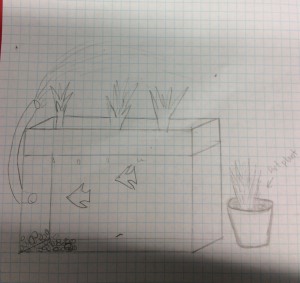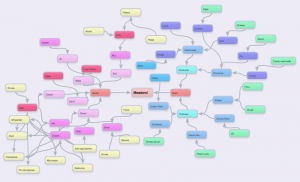Name: Meadow September 9, 2016
Humanities Making Thirteen Colonies
Directions: Finish reading chapter 1 in Making Thirteen Colonies. Answer the following questions below, responding in complete sentences and using textual evidence and analysis. This assignment is due Monday, September 12th. Proofread your work carefully.
1.What is the main idea of this chapter?
The main idea in this chapter is that new ideas are pushing away religion to make space for science in the new world. It is all about change and how change will keep coming. Galileo took up Copernicus’s work and started to think of the world differently. “Everyone knew that the planets and stars and sun all revolved around the earth. If that idea was wrong then the pope and all of Europe’s rulers were wrong.” Page 16 by Hakim. All that Galileo had to do now was to prove it, prove that almost everyone in the world wrong. And you have to be convincing to change the idea that is so deeply engraved in everyone’s mind. This was just the beginning to a whole new world. After that, people started inventing things, having more questions and ideas. The world started to change for the better. Religion, however, took a different path. Everyone became so interested in science and education, so much so that the prior religious ideas no longer made sense. Science was taking over the world, and it started with two very important people.
2 Identify/Define the following names/terms:
(no textual evidence needed for these)
- Galileo Galilei:
Galileo was an Italian scientist that discovered an idea that was soon to change the world. He believed that the sun just might be the center of the universe, instead of the earth which was currently indoctrinated in many of the European’s minds. He got this idea after a comet soared across the sky in 1607. Nicholas Copernicus, another astronomer just like Galileo, had his own doubts about the solar system well before Galileo was even alive. Before Copernicus died in 1543, he had the hypothesis that planets and stars all revolved around the sun. During his life, this idea went unrecognized for many years. It went against everything that Europeans knew. No one believed him; his idea never caught on. Several years later after Galileo was born, he was contemplating his research. If that is all true, it challenged the Pope and all of the most powerful European leader’s beliefs. “Of course, that disturbing idea got Galileo into a lot of trouble.” Page 16 by Hakim. Later in life Galileo was put under house arrest by the Pope. But before then, Galileo did a little bit of tinkering. “In 1609, just two years after the comet appeared, Galileo built one of the world’s first telescopes.” Page 16 by Hakim. This telescope was different than any other. This one was stronger and more powerful, powerful enough to see into space. Galileo changed the way people thought of science and space.
- Nicholas Copernicus:
Copernicus was a Polish astronomer who had the idea that the earth orbited around the sun not vice versa. Copernicus was all alone with his idea; no one stood by him or believed him at all. Copernicus did a lot of research and spent his entire life’s focus on showing his idea to Europe. Copernicus ran out of time before he saw his life’s work truly appreciated. Time went by and still no one knew the truth about the world. Later Galileo look into it and study his idea and decided that he could be correct. Galileo made it his life’s work. Sadly Copernicus was dead long before Galileo found out the truth about the world. Copernicus’s idea lived on. Galileo shared it with the world and it would have made Copernicus very happy.
- How did Copernicus, and later Galileo, challenge religion and tradition in the sixteenth century?
Copernicus and Galileo both saw the world differently from others. For most of Copernicus’s life he tried to prove it, but he died before his idea got famous. But Galileo took up his studies and found the idea very interesting. The famous idea that we now all know to be partially true is, “… the sun, not the earth, was the center of the universe.” Page 16 by Hakim.(we now know that the sun is the center of our solar system not the universe. The center of our universe is a black hole.) This idea went against all the important leaders of Europe and most importantly the Pope. The Pope saw this as a threat to religion and locked him away. “Galileo was disgraced by the Catholic Church and put under house arrest for saying that the earth moves around the sun.” Page 16 by Hakim. Luckily the idea was already spreading. “…by the end of the 17th century, most of the new scientific beliefs about the earth and skies were commonly accepted.” Page 16 by Hakim. Some people died trying to prove this theory and now it is common knowledge. So thank you Nicholas Copernicus and Galileo Galilei for your intelligence and perseverance to make this world better.


